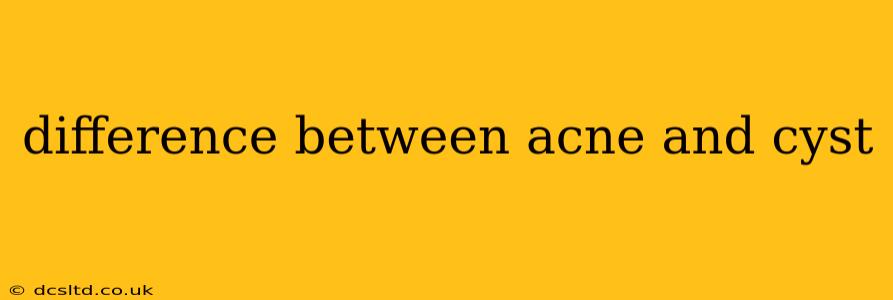Acne and cysts are both skin conditions that can cause bumps and blemishes, leading many to confuse them. However, they are distinct conditions with different underlying causes, appearances, and treatments. Understanding the key differences is crucial for effective management and preventing potential complications. This comprehensive guide will clarify the distinctions between acne and cysts, addressing common questions and providing valuable insights.
What is Acne?
Acne vulgaris, commonly known as acne, is a chronic inflammatory skin condition affecting the pilosebaceous units—the hair follicles and their associated sebaceous (oil) glands. It typically presents with various lesions, including:
- Comedones (blackheads and whiteheads): These are clogged pores, with blackheads being open and exposed to air, while whiteheads are closed and remain under the skin's surface.
- Papules: Small, red, inflamed bumps.
- Pustules: Papules filled with pus.
- Nodules: Larger, deeper, and more painful inflamed lesions.
- Cysts: While cysts can be a severe form of acne, it's crucial to note that not all acne involves cysts. These cystic acne lesions are usually larger, deeper, and more painful than other acne lesions.
Acne is primarily caused by a combination of factors including excess sebum production, bacterial overgrowth (primarily Cutibacterium acnes), inflammation, and hormonal influences. It's more common during puberty but can persist into adulthood.
What is a Cyst?
A cyst is a sac-like structure under the skin's surface containing fluid, semi-solid material, or air. While acne can include cysts as a severe form of the condition, cysts can also develop independently, unrelated to acne. These non-acne-related cysts can form in various parts of the body and may result from blocked ducts, infections, or other underlying conditions.
Epidermoid cysts, a common type, are benign (non-cancerous) and often develop as a result of a blocked hair follicle. They typically appear as firm, round bumps that may be slightly painful or discolored. Unlike many acne lesions, they often don't have a visible opening or pus.
What are the Key Differences Between Acne and Cysts?
The primary difference lies in their underlying causes and the nature of the lesions:
| Feature | Acne | Cyst |
|---|---|---|
| Cause | Excess sebum, bacteria, inflammation, hormones | Blocked ducts, infection, other underlying conditions |
| Appearance | Comedones, papules, pustules, nodules, potentially cysts | Firm, round bump, often without a visible head or pus |
| Depth | Varies, from superficial to deep | Typically deep, located under the skin |
| Pain | Varies, from mild to severe | Can be painful, depending on size and location |
| Treatment | Topical treatments, oral medications, sometimes professional extraction | Drainage (often by a medical professional), sometimes surgical removal |
How Can I Tell the Difference Between a Pimple (Acne) and a Cyst?
Distinguishing between a pimple and a cyst can be challenging, even for healthcare professionals. However, some general guidelines can help:
- Size and Depth: Cysts are typically larger and deeper than pimples. They often feel firmer and more deeply embedded in the skin.
- Appearance: Pimples often have a visible head (pus), while cysts might appear as a smooth, rounded lump.
- Pain: Cysts are often more painful than pimples.
- Duration: Cysts tend to last longer than pimples.
What are the Treatment Options for Acne and Cysts?
Treatment for acne and cysts differs significantly:
-
Acne: Treatment approaches vary depending on severity and range from over-the-counter topical treatments (benzoyl peroxide, salicylic acid) to oral antibiotics and isotretinoin (Accutane) for severe cases.
-
Cysts: Treatment often involves drainage by a dermatologist or other medical professional. Larger or recurring cysts may require surgical removal. Antibiotics may be prescribed if an infection is present.
Can a Cyst Be a Form of Severe Acne?
Yes, a cyst can be a manifestation of severe acne. In these cases, the cyst is a particularly deep and inflamed lesion associated with the acne process. However, it's crucial to remember that not all cysts are related to acne.
This information is for general knowledge and does not constitute medical advice. Always consult a dermatologist or healthcare professional for diagnosis and treatment of any skin condition. They can accurately determine whether your skin lesion is acne, a cyst, or another condition and recommend the most appropriate treatment plan.
